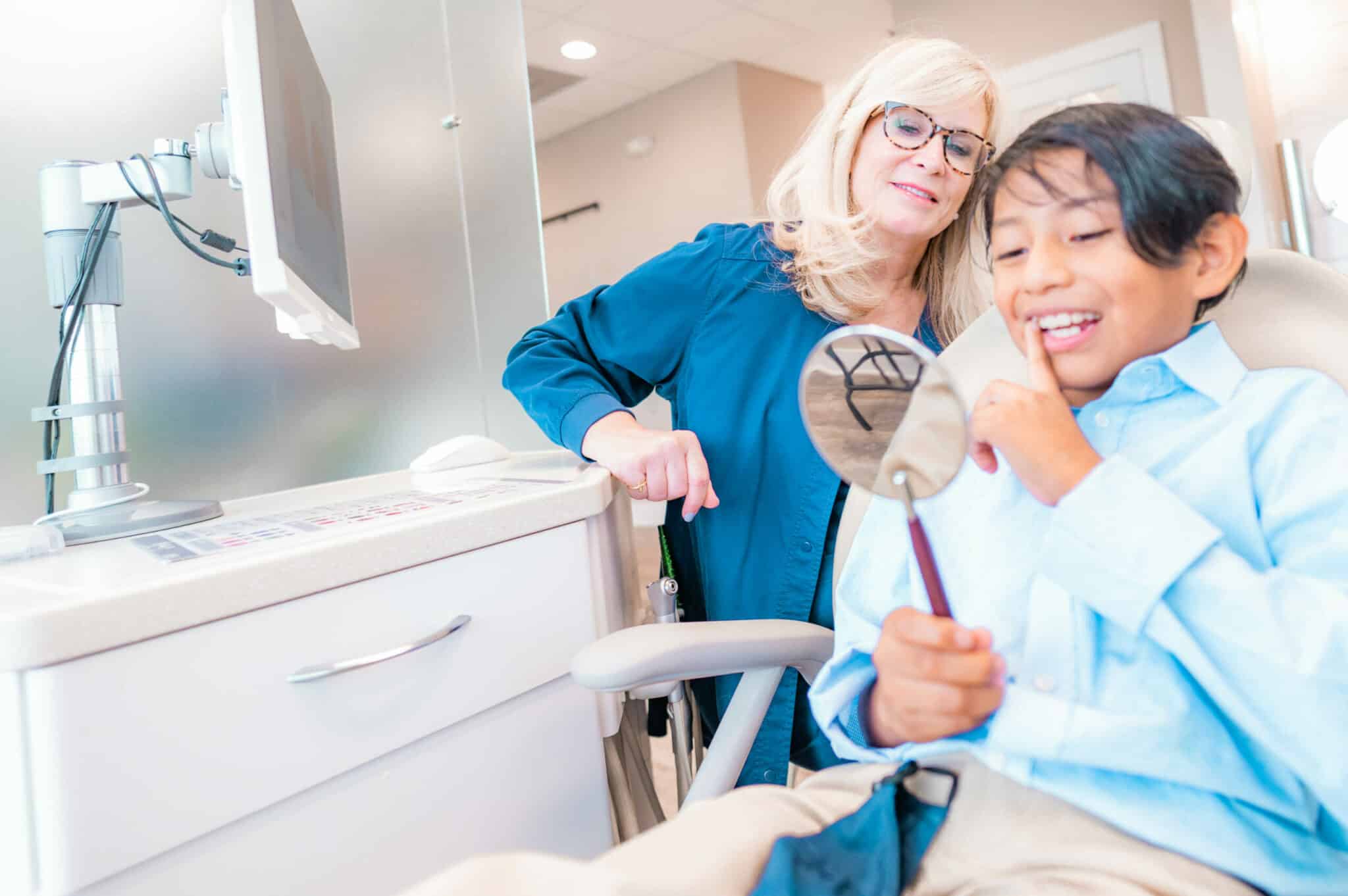Braces and Invisalign create amazing smiles, but a bit of discomfort can be involved. You’ve probably heard that your teeth and gums may be sore after getting your braces or Invisalign clear aligners. But can braces cause headaches? Can Invisalign cause headaches?
These are some questions we get at Smiles by the Bay about braces or Invisalign orthodontic treatment. We have answers on what you can expect with braces or Invisalign and what you can do if you get headaches with braces or Invisalign.

Can My Braces Cause Headaches?
You may feel some discomfort right after you get your orthodontic braces and after braces tightening. This is normal with how braces work and can be treated with over-the-counter pain medication.
You can rinse your mouth with warm saltwater to soothe your teeth and gums. This can be done several times a day as needed.
Usually, the discomfort is related to the jaws. The pain would rarely cause a braces headache. If you experience headaches while wearing braces, over-the-counter pain relievers should take care of it.
Can Braces Give You Migraines?
Braces usually don’t cause migraines. Instead, migraines are caused by other conditions, such as bruxism (grinding teeth). Bruxism can be caused by a misaligned jaw or bite. Braces correct your misaligned bite, which should reduce or eliminate your bruxism.
Talk to us if you believe you are grinding your teeth in your sleep or getting frequent headaches. We can recommend solutions, including wearing a nightguard to position the jaw so you won’t grind your teeth.

Can My Invisalign Cause Headaches?
What if Invisalign is your treatment option? Invisalign works in the same way as braces by applying gentle pressure to move your teeth. You may have some discomfort the first time you get Invisalign as your teeth begin to move.
Unlike braces, Invisalign’s clear trays are removable. Every week or two, you switch out your current aligners for the next set in a sequence. Each new set moves your teeth a little more.
After changing clear aligners to the next set, you may feel discomfort for a day or two. However, you shouldn’t get any major headaches from your Invisalign.
Can Invisalign Give You Migraines?
As with braces, Invisalign clear aligners are designed to straighten your teeth and misaligned jaws. This should reduce or prevent the migraines you may have suffered before Invisalign.
Invisalign shouldn’t cause migraines itself. Rinse with warm salt water if your mouth is tender after switching your trays. This should reduce any inflammation or discomfort.
If you do get Invisalign headaches or if your headaches persist, call us at Smiles By the Bay. We will get you in to check that your braces or Invisalign trays aren’t too tight on your teeth.

Side Effects of Braces for Adults
Braces treatment may have other side effects. One of the most common is mouth irritations from the braces or Invisalign rubbing against your cheek, gum, lips, or tongue. The best solution is to use braces wax, also called dental wax or orthodontic wax.
How do you use braces wax? Pull off a pea-size piece of wax and roll it between your fingers to warm and soften it. Place the braces wax on the area of your braces or Invisalign, causing irritation. Mold the wax around the bracket or area on your Invisalign tray with your finger.
Your mouth will “toughen up” and get used to your braces or Invisalign the longer you wear them.
Braces and Invisalign Treatment in Annapolis, MD
Do braces cause headaches? Can Invisalign cause headaches? Neither should cause headaches during your treatment. If they do, it should be around the time your braces are tightened or Invisalign trays are switched, and the headaches should be minor and shouldn’t last long.
You shouldn’t get migraines from your braces or Invisalign. If this happens, you can schedule an appointment with Smiles by the Bay in Annapolis, MD. You can also get braces in Kent Island, MD, or Denton, MD, at Smiles by the Bay. Stop in to see us, and we can examine you and determine whether there is an issue with your braces or Invisalign.







